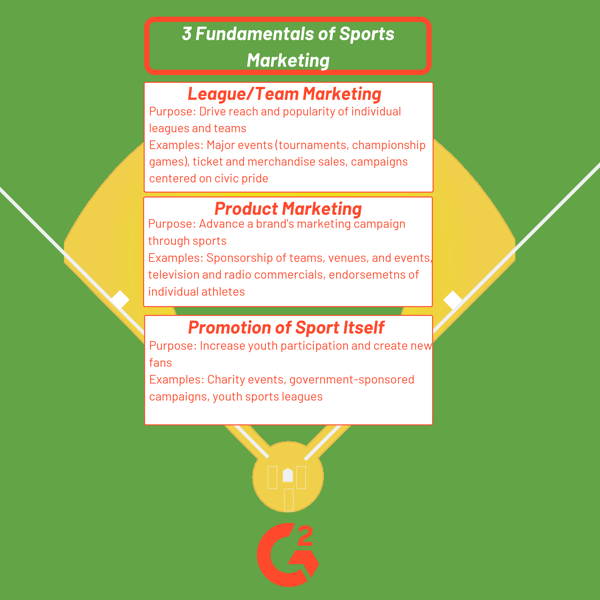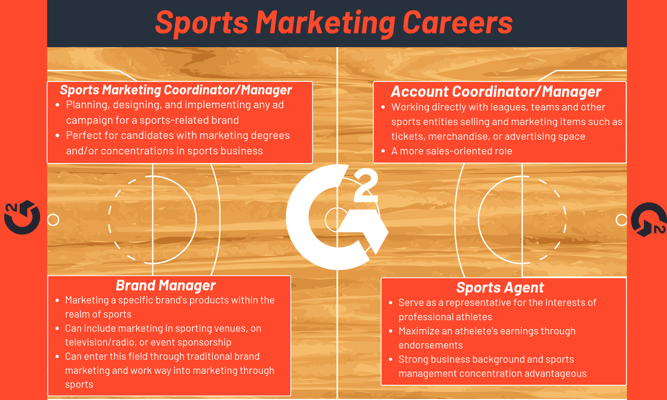
July 1, 1941, marked the beginning of a new era in marketing.
Bulova Watches ran the first television commercial, changing the landscape of how brands can reach their consumers. What was the occasion for this revolutionary development? A National League baseball game between the Brooklyn Dodgers and the Philadelphia Phillies.
From this moment, it became clear that marketing and sports are intertwined more than you might think. Sports, what philosopher Bernard Suits once deemed “the voluntary acceptance of unnecessary obstacles,” is a multi-billion dollar opportunity on which marketers have been capitalizing on since its earliest days of popularity.
Sports marketing encompasses both the promotion of sports brands (such as leagues, events, and teams) and other commercial products and services through the lens of sports.
From television and radio commercials to email marketing and a strong brand presence, odds are you most likely run into some form of sports marketing every day. But how did we get here?
We’ll go over the three fundamentals of the industry, examples of sports marketing, and career paths you can explore within sports marketing.
The term “sports marketing” alone casts a wide net across what can seem like an infinite number of channels, brands, and strategies. From taxpayer-funded downtown stadiums to the inundation of network and cable television with 24-hour sports programming, the fluidity between sports and the rest of society and culture has been so drastic over the past 150 years that it’s hard to even separate it as its own industry.
A large part of this is due to the advent of sports marketing, an industry still on the rise and influencing some of the top marketing and business professionals to focus their attention on sports as a way to increase revenue.
The vastness of the sports marketing field has become too much to even describe in 2019. Looking at one professional sports organization alone, the many different forms that sports marketing takes are a lot to dissect. From the leagues and teams themselves creating their own campaigns to various brands and companies capitalizing on the popularity of sports to further their marketing efforts, there are many moving parts involved in sports marketing.
Here are the three fundamental elements of the field as a whole:
The first aspect of sports marketing is the leagues, organizations, and entities directly involved with the industry itself. Sports marketing provides a rare opportunity for companies, such as leagues and teams, to have millions of people watching them operate on a day-to-day basis. Imagine your brand getting exposure simply because people watched you at work!
Leagues and brands gain national exposure through their presence on network and cable television and the grips of fandom. Think of all of the guerrilla marketing that leagues and teams are able to accomplish through selling fan merchandise and making their logos wearable and visible to the masses.
Social scientists argue that the ties one forms in their youth are stronger than those formed later in life and harder to shed. Sports marketers understand the importance of gaining young fans and how this brand awareness can continue for life.
Advertising of leagues and teams is encompassed in events such as the World Cup and NCAA Tournament. Events like these, often laden with sponsors (we’ll cover those below), are natural ways to showcase different teams, individual players, and raise the stakes of the game to draw the attention of more viewers.
The ability of leagues and teams to promote themselves through events, media coverage, and thus the following of legions of fans, creates a massive financial opportunity for these entities to gain revenue through such outlets as television deals and the sales of tickets and merchandise.
Think of the last time you watched a sporting event on television or listened to the radio. The sheer quantity of advertisements, be it during commercial breaks or even in the course of the broadcast itself, is staggering.
A metric from Nielsen shows that seven of the top ten most watched shows in America in 2018 were sports, with five of them being NFL broadcasts. These findings alone reveal the massive opportunity for brands if they are willing to spend their marketing budgets on sports-related campaigns.
The cross of product marketing and the actual competition itself gives further clout to these product marketers. In auto racing, the cars themselves are littered with advertisements, as are the soccer jerseys worn by players on the field and outfield walls in ballparks. As more emphasis is placed on the in-home viewing experience by leagues and networks, product marketers are more willing to shell out big money for marketing campaigns intertwined with the viewing experience. Money found that the average 30-second Super Bowl ad sells for over $5 million.
Sponsoring of events, teams, and individual athletes are all well-known examples of product marketing through sports. Athlete endorsement deals can result in the athletes actually using particular products while on display for viewers, and often come with an enormous price tag for this unique type of exposure.

The third area of sports marketing is through advancing the popularity of the sport itself, which is in the interest of all parties involved. From the time of Theodore Roosevelt encouraging college-aged men to play football to prepare them for war, sports participation has been promoted by voices in both public and private sectors for a multitude of reasons.
Today, charity organizations such as R.B.I. or First Tee are initiatives that help grow their respective sports and attempt to raise interest in the games from a young age, breeding further interest in the future.
Youth sports leagues and charity initiatives are often backed by parent organizations such as professional leagues that are interested in keeping the sport popular across lines of age, gender, and socioeconomic status.
Careers in the field of sports marketing range from working directly with teams and leagues to working for individual athletes or for adjacent brands.
A Sports Marketing Coordinator or Manager works directly for a team, league, or sports marketing firm. Their job is similar to that of a marketer for any other brand. Daily responsibilities include planning, designing, and implementing an advertising campaign for a sports-related brand.
This position is ideal for job seekers that have marketing or event marketing degrees and are experienced users of marketing or event marketing software, as well as concentrations in sports business. Because the position is one directly in the highly-competitive field of sports, there is a tall barrier to entry among candidates with backgrounds that contain past sports marketing experience or specific degrees or concentrations in sports business.
A position that can be in the field of sports marketing, but not directly under the direction of a sports league, team, or agency, is that of brand manager for a company that markets through sports. Marketing specific brand’s products within the field of sports can include marketing in sporting venues, on television and the radio, or sponsoring events or uniforms.
One benefit of this brand marketing role is that one can enter through a non-sports background and make your way into working with sports teams, leagues, and agencies through their brand marketing expertise. This type of work within sports marketing could be perfect for experienced marketers looking to enter a new field of marketing.

A position in sales is another way to break into the sports marketing industry. With an Account Coordinator or Manager position, you’ll be on track to work directly with leagues, teams, and other sports entities. Selling and marketing items such as tickets, merchandise, or advertising space is a hands-on way to enter the sports marketing industry from the sales side of things.
Another career in the sports marketing field is a Sports Agent. Serving as a representative for the interests of professional athletes is a way to leverage the interests of the teams and leagues, individual athletes, and brands that all intersect in the sports marketing industry. Your main goal as an agent will be to maximize an athlete’s earnings through their contracts and endorsements and yes, show them the money.
While it may not be as dramatic as depicted in Jerry Maguire, a position as an agent is highly sought after and extremely competitive. Agents come from a wide range of backgrounds, from finance to law to marketing, and are expert writers and negotiators.
There are no signs of the world’s infatuation with sports slowing down anytime soon, and the field of sports marketing will continue to have plenty of opportunities for marketing professionals to jump in and test the waters. Sports marketing offers opportunities to work on many different sides of a thriving industry and will provide a new set of challenges for experienced marketers who haven’t given a transition to sports any thought beforehand. And if you're interested in the latest trends in sports-related software, check out this guide to team management software.
Rob is a former content associate at G2. Originally from New Jersey, he previously worked at an NYC-based business travel startup. (he/him/his)
By the time you finish reading this, thousands of digital marketing campaigns will have been...
 by Ninisha Pradhan
by Ninisha Pradhan
It's true, your buyers are online – but they're also at the grocery store, that conference...
 by Lauren Pope
by Lauren Pope
Looking to freshen up your spa's marketing tactics in the upcoming year?
 by Arash Asli
by Arash Asli
By the time you finish reading this, thousands of digital marketing campaigns will have been...
 by Ninisha Pradhan
by Ninisha Pradhan
It's true, your buyers are online – but they're also at the grocery store, that conference...
 by Lauren Pope
by Lauren Pope


